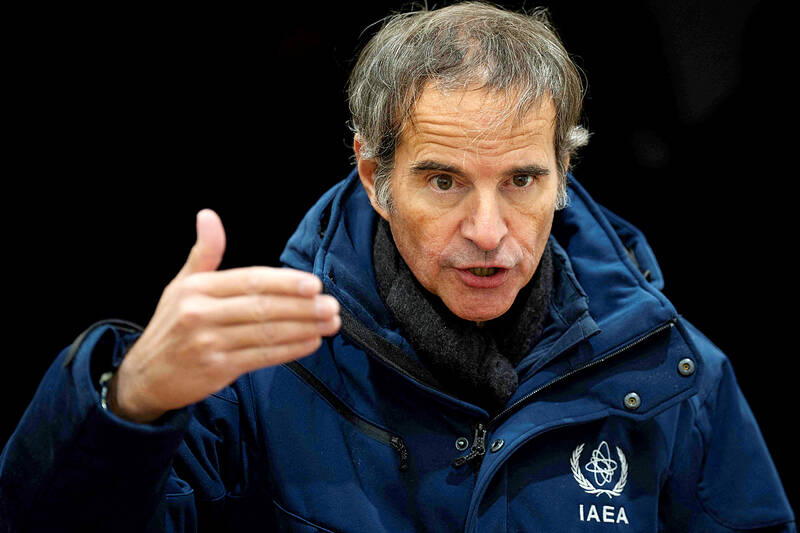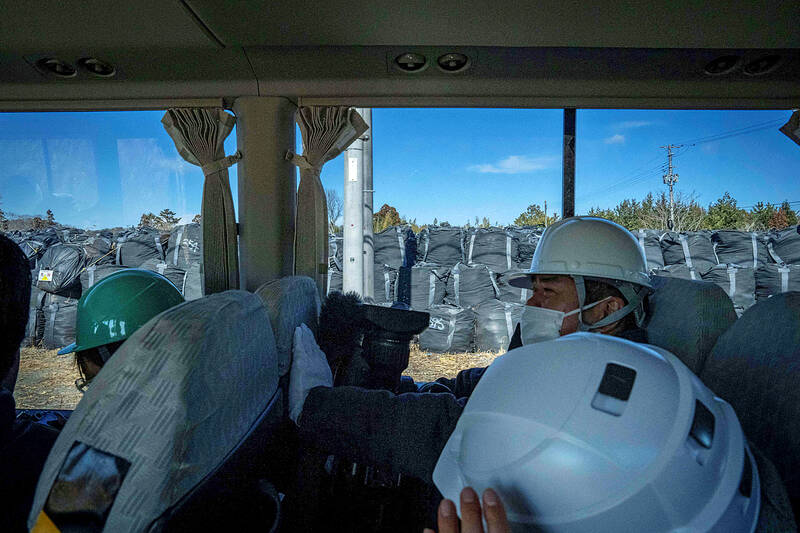The UN nuclear watchdog chief yesterday visited Japan’s stricken Fukushima Dai-ichi plant, a day after Tokyo approved an energy plan that marks a return to nuclear power.
The International Atomic Energy Agency (IAEA) is monitoring Japan’s efforts to decommission the Fukushima plant after a 2011 earthquake-triggered tsunami killed 18,000 people and set off the worst nuclear disaster since Chernobyl.
As IAEA Director-General Rafael Grossi arrived in Japan on Tuesday, the Cabinet adopted a plan to increase reliance on nuclear power to help meet growing energy demand from artificial intelligence (AI) and microchip factories.

Photo: AFP
“At a moment where Japan is embarking on a gradual return to nuclear energy in its national energy mix, it is important that this is also done in complete safety and with the confidence of the society,” Grossi said after meeting Japan’s foreign minister.
Japan had previously vowed to “reduce reliance on nuclear power as much as possible.”
However, the pledge was dropped from the latest Strategic Energy Plan — which includes an intention to make renewables the country’s top power source by 2040.

Photo: AFP
Under the plan, nuclear power would account for about 20 percent of Japan’s energy supply by 2040, up from 5.6 percent in 2022.
The shift back to nuclear power comes as Japan contends with how to remove about 880 tonnes of radioactive debris from the Fukushima Dai-ichi reactors.
So far, only one tiny sample has been retrieved by a robotic claw.
Grossi, making his fifth visit to Fukushima, viewed the vast “interim” contaminated soil storage facilities near the plant for the first time.
About 13 million cubic meters of soil — enough to fill 10 stadiums — was scraped from the region to remove radiation.
About 300,000m3 of ash from incinerated organic material is also being stored.
Reporters yesterday saw trucks and construction vehicles going back and forth between several spots where hundreds of large soil-filled black bags were stacked.
Japan plans to recycle about 75 percent of the soil — the portion with low radioactivity — for building projects such as road and railway embankments.
The remaining material would be disposed of outside the Fukushima region ahead of a 2045 deadline.
“In terms of the timing, which has been, of course, set by law for 2045, we believe that it is not unrealistic. It can be done,” Grossi told reporters yesterday.

Nvidia Corp yesterday unveiled its new high-speed interconnect technology, NVLink Fusion, with Taiwanese application-specific IC (ASIC) designers Alchip Technologies Ltd (世芯) and MediaTek Inc (聯發科) among the first to adopt the technology to help build semi-custom artificial intelligence (AI) infrastructure for hyperscalers. Nvidia has opened its technology to outside users, as hyperscalers and cloud service providers are building their own cost-effective AI chips, or accelerators, used in AI servers by leveraging ASIC firms’ designing capabilities to reduce their dependence on Nvidia. Previously, NVLink technology was only available for Nvidia’s own AI platform. “NVLink Fusion opens Nvidia’s AI platform and rich ecosystem for

‘WORLD’S LOSS’: Taiwan’s exclusion robs the world of the benefits it could get from one of the foremost practitioners of disease prevention and public health, Minister Chiu said Taiwan should be allowed to join the World Health Assembly (WHA) as an irreplaceable contributor to global health and disease prevention efforts, Minister of Foreign Affairs Lin Chia-lung (林佳龍) said yesterday. He made the comment at a news conference in Taipei, hours before a Taiwanese delegation was to depart for Geneva, Switzerland, seeking to meet with foreign representatives for a bilateral meeting on the sidelines of the WHA, the WHO’s annual decisionmaking meeting, which would be held from Monday next week to May 27. As of yesterday, Taiwan had yet to receive an invitation. Taiwan has much to offer to the international community’s

CAUSE AND EFFECT: China’s policies prompted the US to increase its presence in the Indo-Pacific, and Beijing should consider if this outcome is in its best interests, Lai said China has been escalating its military and political pressure on Taiwan for many years, but should reflect on this strategy and think about what is really in its best interest, President William Lai (賴清德) said. Lai made the remark in a YouTube interview with Mindi World News that was broadcast on Saturday, ahead of the first anniversary of his presidential inauguration tomorrow. The US has clearly stated that China is its biggest challenge and threat, with US President Donald Trump and US Secretary of Defense Pete Hegseth repeatedly saying that the US should increase its forces in the Indo-Pacific region

ALL TOGETHER: Only by including Taiwan can the WHA fully exemplify its commitment to ‘One World for Health,’ the representative offices of eight nations in Taiwan said The representative offices in Taiwan of eight nations yesterday issued a joint statement reiterating their support for Taiwan’s meaningful engagement with the WHO and for Taipei’s participation as an observer at the World Health Assembly (WHA). The joint statement came as Taiwan has not received an invitation to this year’s WHA, which started yesterday and runs until Tuesday next week. This year’s meeting of the decisionmaking body of the WHO in Geneva, Switzerland, would be the ninth consecutive year Taiwan has been excluded. The eight offices, which reaffirmed their support for Taiwan, are the British Office Taipei, the Australian Office Taipei, the